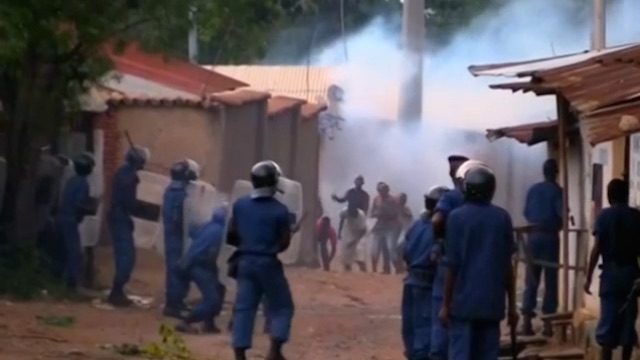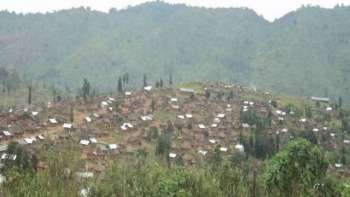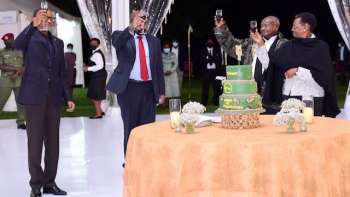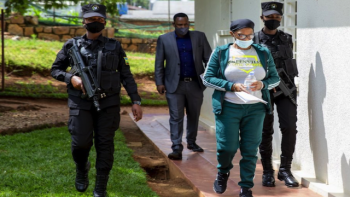Despite international warnings to African dictators against seeking to extend their reign by changing the constitution of their countries, the Burundian President Pierre Nkurunziza has decided to oppose defiance. He has decided to ignore the Burundian Constitution and run for a banned third term. He has chosen to become a dictator. The move has baffled most of the observers of the Burundian politics, who point to how democracy was gained, after decades of bloody civil wars, massacres, and genocides. The current and first democratically elected government of Burundi in its history followed hundreds of years of Tutsi minority rule that often resorted to genocide and mass murders targeting the Hutu masses to maintain itself in power.
The advent of democracy had hence signaled a new era of hope in Burundi. The decision by President Pierre Nkurunziza appear to have dashed these hopes. Immediately after the announcement to run for the third term, Burundian citizens poured into the streets and have been protesting. The police and the military have responded with lethal force, killing and arresting political leaders. Government sponsored mobs have also attacked civilians and opposition leaders. Police and protesters have clashed for four days. Burundi may be at the verge of sliding into chaos and civil war.
The situation is so worrisome that the US Government has sent Tom Malinowski, U.S. assistant secretary of state for democracy, human rights and labor, to Burundi. Before arriving, Tom Malinowski wrote on Twitter: "Disappointed President Nkurunziza violating Arusha Accord."
Collapse of Templates of Peace Among Ethnic Groups and Ignoring the Constitution.
The AfroAmerica Network article of February 5, 2014 titled "Burundi on the Path of South Sudan?" higlighted the major problem in Burundi and the role Pierre Nkurunziza has played.
In February 2014, the Burundian Vice President, Bernard Busokoza, disappeared after weeks of disagreements with Pierre Nkurunziza. Bernard Busokoza had allegedly criticized Pierre Nkurunziza for seeking to modify the constitution so that he may run again. Pierre Nkurunziza’s supporters then accused Bernard Busokoza and his allies of undermining the government. Fearing for his life, according to his supporters, Bernard Busokoza chose to flee.The disagreements became so divisive that the supporters of the two leaders entrenched in their position, started to air their differences in social medias and bars around Bujumbura, Bururi, and Gitega.
The discussions quickly turned to ethnic divisions: Pierre Nkurunziza is from the Hutu ethnic majority, whereas Bernard Busokoza is from the Tutsi minority. Until the late 1990’s, the Tutsi minority had managed to dominate all the government and non-government institutions and businesses. Regular violences, including systematic massacres of Hutu intellectuals have marked the history of Burundi, since the 1960’s. The first democratically elected Hutu president, Melchior Ndadaye, was assassinated by Tutsi military officers in 1993. He was replaced by another Hutu, Cyprien Ntaryamira. He was also assassinated in 1994, along with Rwandan President Juvenal Habyarimana, allegedly by the Tutsis of the Rwandan Patriotic Front, now ruling Rwanda. These assassinations were followed by ethnic violences and massacres in both Burundi and Rwanda.
A civil war ensued in Burundi, pitting the Hutu armed group, CNDD-FDD, against the Tutsi government of UPRONA. Negotiations among the two warring parties led to the Arusha Peace Agreement, brokered by Nelson Mandela of South Africa and Julius Nyerere of Tanzania.
The Arusha Agreement was aimed at finding a solution to the ethnic tensions among the two main Burundian ethnic groups: Hutu and Tutsi. Under the accord, the Government and the National Assembly were to be divided among the two groups, with the Hutu representing 60 percent and the Tutsi, 40 percent. The two groups were to equally share the Senate, the Army, and the Police. Bernard Busokoza was supposed to serve as the Tutsi counterbalance to the Hutu Pierre Nkurunziza. Pierre Nkurunziza ignored the agreement. He has now gone further: he ignored the Constitution.
Pierre Nkurunziza Seeks Rwandan Paul Kagame's Advice.
In preparation for changing the constitution and as many Burundians, fearing for their lives started fleeing to Rwanda, Pierre Nkurunziza made several trips to the Southern Rwandan town of Butare. There, according to sources close to the Rwandan Presidency, he met Rwandan President Paul Kagame. According to the same sources, Pierre Nkurunziza asked to meet Paul Kagame in order to inform him about the situation in Burundi, get the Burundian refugees to be returned back, and seek advice on better ways to navigate the constitutional change. Paul Kagame promized to look into the issue of the Burundian refugees and advised Pierre Nkurunziza to ignore ciritics and run for a third term.
However, after the meeting, Paul Kagame told his advisers that he has never met such a "stupid" head of state in his entire life.
"Not sure whether it is the person [Pierre Nkurunziza] or it is genetics, but I cannot understand how some one leading a country can be such moron. Yesterday he was against us, allying himself with Jakaya Kikwete. Now, he is knocking at my door seeking advice !", Paul Kagame told his close aides, before adding: "He[Pierre Nkurunziza] is so stupid that he will not even know what hits him".
Chaos in Burundi, A golden Opportunity for Paul Kagame
After the meeting, Paul Kagame called his closest aides and told them: "this is a golden opportunity. Chaos in Burundi means that we can do what we want, without being the target of the international pressure. The question is now: how do we take opportunity from the chaos in Burundi and the stupidity of its leaders."
Among the risks identified were a civil war in Burundi and the potential for the intervention from Tanzania and a spillover to Rwanda. To avoid the such a scenario, it was convened to get ready for war, by first launching a media campaign and arming themselves.
For the media, it was decided to plant stories accusing Burundian government of trying to recruit Rwandan rebels from the Democratic Republic of the Congo and to prepare a genocide. Then, to argue that Rwandan military should intervene to stop genocide. Then Paul Kagame travelled to Ethiopia, where he spend three days and Algeria, to seek military aid and weapons. Ethopian Government has promised to provide any military aid.
After Algeria, Paul Kagame travelled to the United States where he has been meeting his lobby groups and sponsors, to explain his strategy and rally support.
Two of Kagame's aides were selected to lead the operation. The current Minister of Defense, General James Kabarebe will be in carge of readying the army for war, whereas Mnister of Foreign Affairs, Louise Mushikiwabo will work the media and lobby groups.
















